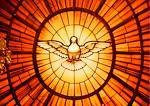
Pentecost Sunday
1.11k
Readings: Acts 2:1-11; Psalm 103; 1 Corinthians 12:3-7, 12-13; John 20:19-23 (alternative second reading and gospel reading: Galatians 5:16-24; John 15:26-27, 16:12-15)

The Holy Spirit is about speech. In the Creed we say of the Spirit that ‘he has spoken through the prophets’ and we read that the Spirit of the Lord ‘fell on [Ezekiel, for example] saying …’. Jesus taught his disciples that they were not to worry about what they should say when called to bear witness to their faith, for the Spirit would give them the words they needed. We read today in Acts 2 that the gift of speech was given to the disciples so that each person listening heard them in his own dialect telling about the mighty works of God. So the Holy Spirit is about speech.
But the Holy Spirit is also about depth. (So many of our words are superficial and glib.) St Paul says that the Spirit searches the depths of everything, even the depths of God. So the Spirit is radical. As one of the psalms puts it, ‘the foundations of the world are laid bare at the blast of the breath of your nostrils’. The foundations of our lives are laid bare and so Jesus, in breathing the Holy Spirit on his disciples, says ‘the sins you forgive are forgiven and the sins you retain are retained’. The Spirit reaches the place from which words come and in which they originate. He has to do with motivation, intention and the conception of words and deeds. He has to do with the thoughts that lie beneath words and deeds and omissions, and even with what lies beneath thoughts. We are given the Spirit to drink and so, just as we are immersed in the Spirit in baptism, the Spirit is immersed in us. Thus Paul says that ‘the Spirit Himself bears witness with our spirit that we are children of God’.

The Holy Spirit is about speech and depth, and so He builds a new community. Communities are established on speech. In his commentary on Aristotle’s Politics St Thomas Aquinas says communicatio facit civitatem, ‘communication makes the city’. Political work and community building are largely about this: getting people to talk, finding words on which parties in dispute can agree, publishing communiques and agreed statements, articulating laws to structure society and the relationships that hold it together. (I once managed to find a form of words on which a very conservative friar and a very liberal one could agree: ‘things have not been the same since Vatican II’!)
The gift of the Spirit at Pentecost reverses the disunity and fragmentation of Babel. We read in Genesis 11 about the Tower of Babel, a story to explain the multiplicity of languages. Trying to reach heaven on the strength of human pride, the races of the earth fall into disunity and the human race fragments. Pentecost reverses this and undoes the effects of human pride. The language of the Spirit is a language everybody understands because it expresses the goal to which everybody aspires, for the language of the Spirit is the language of love.

So the new community is centred on ‘the Word that breathes Love’, Verbum spirans Amorem. Love is the depth of this Word. The people of Israel saw in the law given to Moses the formula of words that would one day unite all the peoples of the earth so that they would live together according to the wisdom and holiness of God. The ‘new law’ foretold by Jeremiah and other prophets is given on Pentecost Sunday to the new Israel, the Christian Church, and so the prophetic promise finds its fulfillment. The community of those who believe in Christ is the community of those who have received the Spirit. They live (or at least ought to live) by this new law written not on stone or paper but on human hearts, a law that searches the depths of everything, reaching not just to external behaviour but to motivation and intention and conception, to what lies at the root of deeds and omissions, words and thoughts.
Christ is the Spirit-filled One, the Anointed from the Father, our Messiah, ‘the breath of our life’ (Lamentations 4:20). A word needs breath if it is to be a living word. Breath needs a word if it is to have form and meaning. So the wonderful works of God which the Church preaches tell of a Father who has embraced the world and taken it to His heart by sending the Son and the Spirit. The Word of God unites all who come into the light of truth. The Spirit of God heals and strengthens so that even our human words become means by which God strengthens the civilization of love. It is often hidden, even in the Church, but we believe that this ‘City of God’ is under construction and that even now there are people who breathe its language.


